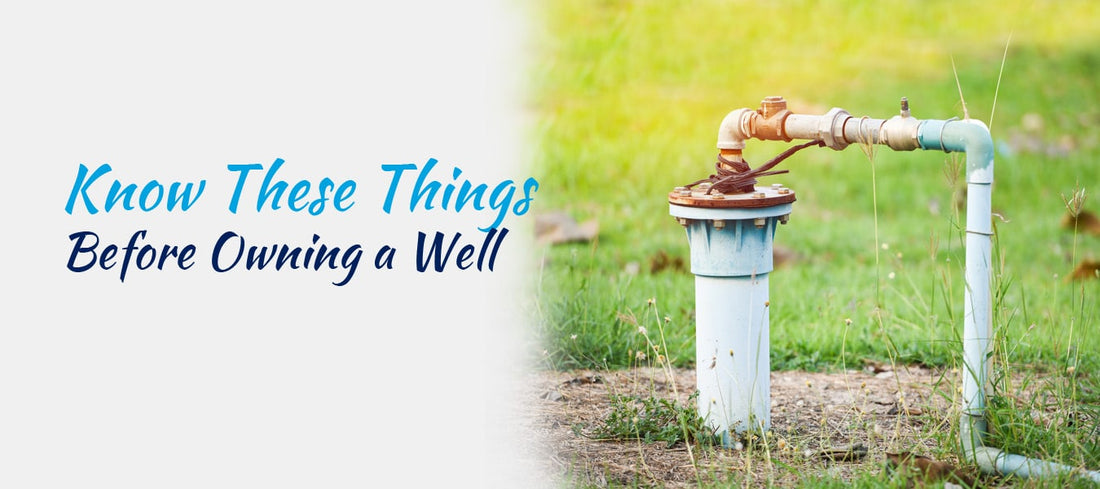Chances are good that you've imagined—at some time or another—what it would be like to give up your daily grind, uproot, and move to the country. Buying a home in the country would mean space for relaxing days, Instagram-worthy views, lower crime rates, and fresh air. Well, rural living can be a dream come true if you're not adequately prepared for it, it could easily become your personal country nightmare. When you’re buying a house, there’s so much paperwork that could easily make you forget about things that are not visible at first sight but are equally important. One of those important things to look into is how using well water will change your daily lifestyle. For people unaware of the taste and feel of well water, it could be difficult to make the transition. It may also create unwanted effects on bathing, laundry, plumbing, and even your appliances.
Educate yourself about well water
If a well is going to be your primary source of water, you must know everything about it that makes it different from a public water supply. Simply put, well water is untreated water that is drawn from a well straight into your taps. It is essentially rain that has moved through the soil into an aquifer. And it can absorb a lot of things along the way. It is important to mention, the quality of water coming out of your well is not regulated. What does it mean for you? This means that it becomes your responsibility to ensure the quality of water flowing out of your tap. However, your local authority is responsible for providing advice and guidance about the protection of your supply. This also means that your water will not contain chlorine which is added to public water supplies to treat water.
Well water is usually hard
Water is an incredible solvent. That is why it dissolves most minerals and organic matter found in the soil. Minerals such as calcium and magnesium can dissolve in water making the water hard. While well water is not inherently hard, to begin with, it is more likely to become hard than other sources because the water is being brought up from the ground rather than from protected reservoirs, which means it has the potential to take on the characteristics of the soil around it. In most areas, a home with a private well will likely require a water softener. If you purchase an existing home, it may already have a water softener installed. Keep in mind, that the water softener may need to be replaced or serviced to efficiently soften the water coming from your well. Discover the benefits of water softeners and how to choose a water softening system to fix hard water problems in your well water.
Water from a well can leave tough stains
When moving into a new home that uses a well, you may notice stains on fixtures and in sinks, tubs, and toilets. Some of this could be limescale buildup due to hardness, however, the most frustrating stains from well water come from high iron content. If there’s excessive iron in your water, you will eventually realise no matter how often you clean your sinks or toilets, there will always be reddish-brown stains around your drain or toilet bowl. In deep wells, where oxygen is low, iron is often present in a dissolved state and appears colourless at the top. Once exposed to air, iron oxidises and leaves unsightly reddish-brown stains on laundry, plumbing fixtures, and appliances. The presence of iron in water also imparts a metallic taste to water which can significantly impact your drinking water. The only way to remove iron from water is by installing specialised iron filtration systems. In some cases, a special media may be used which removes iron as well as softens the water at the same time, reducing the number of treatment equipment needed for your home. Find out which system you need by talking to an expert.
High risk of contamination
There are multiple ways that well water contamination can happen like: heavy rainfall, spring runoff and flood events can overwhelm even well-constructed, recently drilled wells and can introduce surface contaminants into the aquifer below. If your well is older, there are even more potential avenues for surface contamination to enter your drinking water. Water from your well may be contaminated if it is discoloured, even occasionally, or if there is an odour coming from it. Even if your water is crystal clear it may still be contaminated as many of the bugs in water are invisible. Septic tanks located too close to a private well can also cause contamination. One of the biggest concerns is nitrate contamination. At elevated levels, nitrates pose a health risk to pregnant mothers and young children. The best way to ensure the safety of the water you’re drinking is to use filtration equipment. If your well water is microbiologically infected, the best way to treat is by using ultraviolet lights. UV filtration systems deactivate the harmful microorganisms present in water rendering them unable to reproduce. Reverse osmosis systems can also be used to eliminate heavy metals, cysts, and other organic compounds that may be present in the water.
Wells must be tested annually
The quality of water changes throughout the year. Because rain, runoff, and agricultural endeavours can influence the state of your groundwater, testing is the best way to ensure it’s safe to use. Make sure you test your water once a year or so to remain informed on its contents. It should be tested for contaminants such as E.Coli, coliform bacteria, and nitrates at the absolute minimum. If you do notice a change in water quality (appearance, odour, taste, etc.) it’s a good idea to have your well tested, even if it hasn’t been a year since the last test. We recommend a full chemical & bacterial water test from an accredited lab. We can collect samples from your well, send them to our lab, and provide you with reports on water quality. You’ll also have the added convenience and confidence to review results with a professional water treatment expert.
How to fix well quality?
Testing the water is the first step to be sure if your well is contaminated. When you have the well tested, you may discover that it has certain contaminants that make it undesirable, like contaminants that affect the taste, smell or texture of the water. There are different options available to treat contaminated water. Talk to an expert and see what treatment option would solve your problem. Almost any kind of quality issue can be fixed with a proper filtering system. While some water treatment systems can eliminate several pollutants, there is not just one treatment system that can work for every application or water contaminant.

